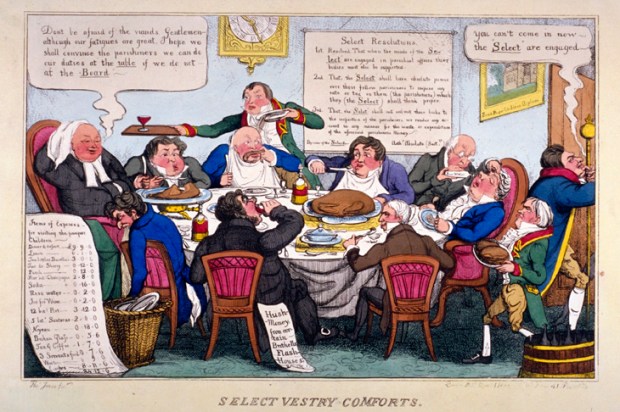‘What might commend so drab a creature to your sight, when overhead the low clouds split and the upturned bowl of a silver moon pours milk out on the river.’
The first reason to read Sarah Perry is right there. She was born and bred a writer and without that, a novelist is worth little. Sometimes she falls in love with her own writing, and adds too many curlicues and decorative elaborations, but there is a stern backbone to Perry and she always pulls herself up from such self-indulgences.
She also knows how to chill, a handy talent when you are writing a Gothic — or hybrid-Gothic, novel.
‘… a woman in dark clothes seen just at the very corner of your eye, slipping from view… or she’ll follow you down paths and alleys in the dark, or come in the night and sit waiting at the end of your bed — can you imagine it, feeling the mattress sink and the sheets move?’
Melmoth the Wanderer (1820), by Charles Maturin, is about a man who sold his soul to the devil in exchange for 150 years more life, and is written as a series of stories within stories.
Sarah Perry has taken that strangely dull, preachy novel, and made it her own, setting it in Prague, a master touch. Her devil is a woman in black, who flits about the world, over the centuries, watching, listening, storing up other people’s secrets. Sooner or later the truth will out: no one ever escapes punishment for their bad deeds. ‘Who knowest the secrets of our hearts’ comes to mind, but there is nothing gracious or forgiving about Melmoth.
That Sarah Perry was brought up in a narrow sectarian church and knows her Bible well is clear. The book has a strong moral tone, an almost Calvinistic ethic and her wonderful prose, when she denies herself the rococo, comes from a lifetime of knowing and loving the Authorised Version.
The novel is told, like Maturin’s, in stories within stories, and contains those fashion-able elements of the historical pastiche, old letters, diaries, timelines, footnotes, which are more thickly spread in novels like The Quincunx and Jonathan Strange and Mr Norrell, though Perry is restrained in her use of them.
The book’s problem lies in just this mixture of styles and narrative methods, and in the juxtaposition of the spooky elements of Gothic — ghosts, shadows, rustling sounds, whispers — with a modern, realistic narrative. The entire point of the first is to make a novel unnerving, shiver-provoking, unsettling. But the entertainment of the ghost and semi-horror Gothic novel is stiffened by and set against some genuinely frightening stories of evil deeds, particularly those relating to Prague itself, and the second world war, and to the Far East, and the truly horrifying portrait of a suffering old woman in hospital, dying slowly and alone, in unspeakable pain and misery. This is hard to read, harder to forget, and sits uneasily against the spookiness and the rustle of old-fashioned garments.
The author has assembled the ingredients of two different kinds of novel and just failed to meld them into a blended whole. The fruit has sunk to the bottom and although both mixture and fruit are excellent in themselves, they have not combined to make the perfect cake.
But Sarah Perry is the real deal, an accomplished and often beautiful writer, and this book, like her first two, is full of power and makes an unforgettable impact. Not every cake, even by the greatest baker, walks off with Best in Show.
Got something to add? Join the discussion and comment below.
Get 10 issues for just $10
Subscribe to The Spectator Australia today for the next 10 magazine issues, plus full online access, for just $10.
You might disagree with half of it, but you’ll enjoy reading all of it. Try your first month for free, then just $2 a week for the remainder of your first year.















Comments
Don't miss out
Join the conversation with other Spectator Australia readers. Subscribe to leave a comment.
SUBSCRIBEAlready a subscriber? Log in